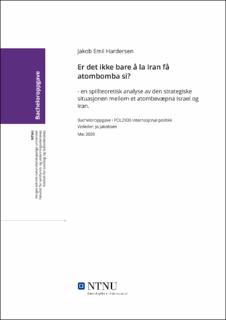Er det ikke bare å la Iran få atombomba si? – en spillteoretisk analyse av den strategiske situasjonen mellom et atombevæpna Israel og Iran.
Bachelor thesis
Permanent lenke
https://hdl.handle.net/11250/2661116Utgivelsesdato
2020Metadata
Vis full innførselSamlinger
Sammendrag
Poenget med denne bacheloroppgaven har vært å avdekke hvordan spillteori kan forklare mekanismene bak hvorfor spredninga av atomvåpen vil føre til en mer stabil eller ustabil region. Oppgaven gjennomfører en spillteoretisk analyse av tre plausible scenarier mellom et atombevæpna Israel og Iran, og forsøker dermed å besvare følgende problemstilling: «Hvordan kan spillteori forklare hvorvidt et atombevæpna Israel og Iran fører til større eller mindre stabilitet i Midtøsten?» Analysen tar som sagt for seg plausible spill hvor det deriblant tenkes at Iran har klart å framstille kjernefysiske våpen. Diskusjonen dreier seg dermed rundt hva slags effekt et atombevæpna Iran vil ha på den strategiske situasjonen med utgangspunkt i avskrekkingsteori. Det konkluderes med at spillteori kan bidra til å avdekke spillernes preferanser, og dermed si noe om hva som er rasjonelle handlinger for den gitte spilleren og omkring hva slags antakelser spillerne tar om hverandre. Som en utledning av dette kommer det fram at både informasjonstilgang og kommunikasjon mellom spillerne er kritisk viktige for å unngå en atomkonflikt. Det vises derfor til at Israel og Iran er nødt til å samarbeide og holde informasjonen om sine preferanser åpen for å motvirke en slik konflikt i Midtøsten. The main purpose of this bachelor thesis has been to unravel how game theory can help explain the mechanisms behind why nuclear proliferation can lead to a more stable or unstable region. The thesis conducts a game theoretical analysis of three plausible scenarios between a nuclear Israel and Iran, and attempts to answer the following question: «In what ways can game theory explain how a nuclear Israel and Iran could lead to more or less stability in the Middle East?» The analysis undertakes three plausible games where in two of them it's understood that Iran has managed to develop nuclear weapons. The discussion revolves around what kind of effect a nuclear Iran could have on the strategic situation with its base found in arguments from deterrence theory. The thesis concludes that game theory could be capable of revealing the preferences of the player and thus illustrate what's expected to be a rational choice and how the players read each other's preferences. As an extension to this, it's revealed that access to information and communication between the players are of paramount importance to avoid a nuclear crisis. The main point is therefore that Israel and Iran have to cooperate and share information about their preferences with each other to combat the development of a nuclear disaster in the Middle East.
